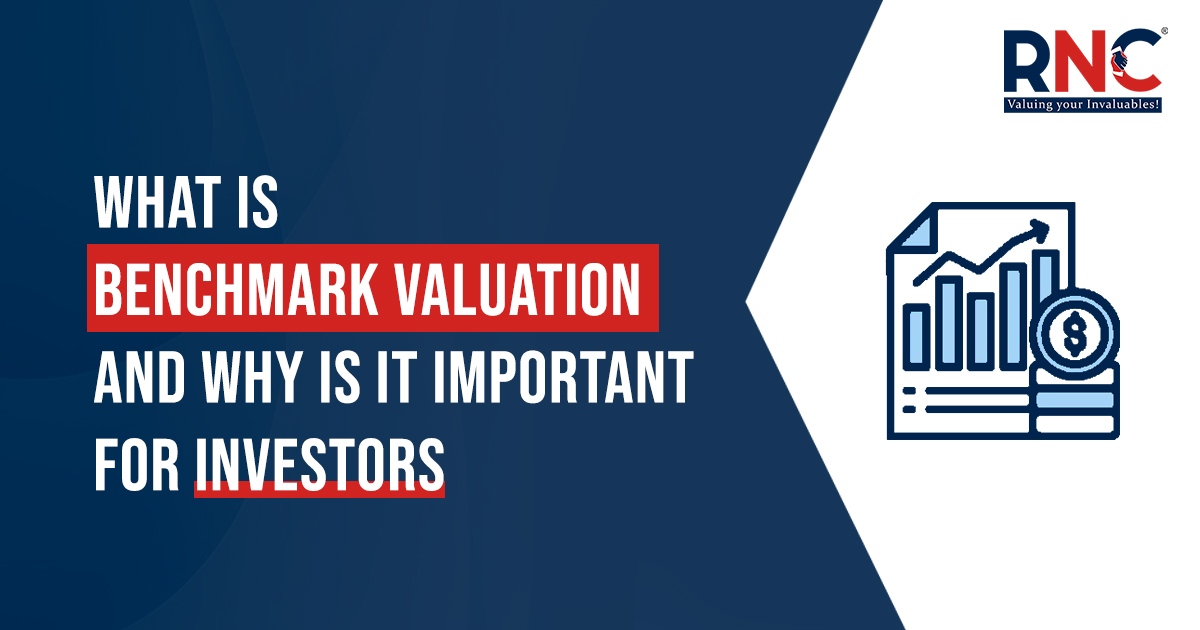
In 2025, with fluctuating markets, rising interest rates, and global valuation reforms, investors increasingly rely on benchmark valuation to measure asset performance, risk, and return.
Whether you’re a venture capitalist, equity analyst, or corporate CFO, understanding how benchmark valuation works helps ensure you pay — or receive — the right price for every investment.
This updated guide by RNC Valuation Experts explains the meaning, methods, and importance of benchmark valuation, along with real-world investor use cases and updated SEBI/ICAI compliance norms.
Key Takeaways:
-
Benchmark valuation ensures fair pricing and investor protection.
-
SEBI and RBI mandate benchmark-based reporting for listed entities.
-
Helps compare investment performance with market standards.
This article has been refreshed with the latest 2025 industry benchmarks, valuation ratios, and investor insights.
Benchmark valuation is one of the most effective tools investors use to determine whether an asset, company, or security is fairly priced compared to its peers. By comparing financial metrics such as price-to-earnings ratios, EV/EBITDA multiples, or industry standards, benchmark valuation provides a quick and reliable check on value.
In 2025, benchmark valuation has become even more critical as investors face volatile markets, shifting sector growth rates, and evolving global benchmarks. This updated guide explains what benchmark valuation means, why it is important, and how investors can use it to make informed decisions across industries.
If you’re an investor, one of the most critical questions you can ask before putting money into a business is: “Am I paying the right price for this investment?”
The answer often lies in benchmark valuation — a proven method of comparing a company’s worth against industry standards, market multiples, and similar businesses.
In 2025, with IPO valuations hitting record highs and M&A activity accelerating in India, understanding benchmark valuation has become more important than ever. From tech startups to manufacturing giants, investors who skip this step risk overpaying, underselling, or missing opportunities entirely.
This guide will show you how benchmark valuation works, why it matters for investors, and how to apply it to make smarter, data-driven investment decisions — backed by real case studies from 2025’s biggest deals.
What Is Benchmark Valuation and Why Is It Important for Investors?
Investing can be difficult, particularly when determining an asset’s or company’s value. Benchmark valuation is a crucial instrument that helps investors through this procedure more easily. However, what is it precisely, and why is it so important to your investment strategy? This blog will delve deeply into the idea of benchmark valuation, examining its advantages, and exploring its methods, benefits, and practical applications for investors.
What Is Benchmark Valuation?
In the language of finance, valuation is the process of figuring out how much an asset or business is now worth. It’s a crucial factor in determining the value of an investment. Investors and analysts assess a company’s worth using various methods that consider its earnings, assets, and market conditions.
The Role of Benchmark Valuation
Benchmark valuation takes this a step further by comparing the value of a company or an asset to a standard reference point or benchmark. This could be a similar company in the same industry, an index, or historical performance. The primary goal is to provide a clearer picture of whether an asset is underpriced, overpriced, or fairly valued, making it a helpful tool for investors in determining their next move.
Why Is Benchmark Valuation Important?
Establishing a Market Standard
One of the primary reasons benchmark valuation is important is that it establishes a market standard. Investors need a reliable metric to compare their investments and see how they fare against others in the same space. This helps avoid risky ventures and allows them to focus on investments that have the potential to offer better returns.
Identifying Investment Opportunities
By using benchmark valuation, investors can identify undervalued or overvalued assets. For example, if a stock’s valuation is lower compared to the industry average, it may indicate a good buying opportunity.
Risk Management and Portfolio Diversification
Benchmark valuation also plays a significant role in risk management. Investors can diversify their portfolios by comparing assets in different sectors and industries, helping reduce overall investment risk while maximizing potential gains.
Learn more : risk inspection and management
Different Methods of Benchmark Valuation
There are several ways to conduct a benchmark valuation, each with its unique focus and methodology:
Price-to-Earnings Ratio (P/E)
The P/E ratio compares a company’s current share price to its earnings per share (EPS). It’s one of the most popular metrics for evaluating stock performance.
Case Study 1: IPO Benchmark Valuation – The FinTech Unicorn
In March 2025, a Bengaluru-based FinTech company went public with an IPO priced at ₹450 per share. While the hype was massive, benchmark valuation analysis revealed the stock was trading at 40% higher P/E ratio than comparable listed FinTech firms.
Investor Insight:
Those who spotted this overvaluation using benchmark metrics avoided entering at the peak and instead bought in 6 months later at ₹320 — locking in a 29% savings on entry price.
Price-to-Book Ratio (P/B)
This ratio compares a company’s market value to its book value (assets minus liabilities). It’s particularly useful for assessing companies in asset-heavy industries like real estate or manufacturing.
Case Study 2: M&A Benchmark Valuation – Manufacturing Sector Buyout
A global conglomerate was considering acquiring a mid-sized Indian manufacturing company for ₹650 crore. Through benchmark valuation, analysts discovered that similar companies with higher EBITDA margins were valued 15% lower in recent deals.
Read more : does impairment affect ebitda in 2025 full guide examples
Investor Insight:
Armed with this data, the buyer renegotiated the deal to ₹550 crore, saving ₹100 crore and improving projected ROI by 18% in the first year.
Comparable Company Analysis
This method looks at similar companies in the same industry and compares their valuation metrics. It’s often used to assess whether a company is underperforming or outperforming its peers.
How Investors Use Benchmark Valuation
Setting Investment Goals
Investors use benchmark valuation to set realistic goals based on market standards. Whether aiming for growth, stability, or income, benchmark valuation offers a goal for setting achievable objectives.
Evaluating Potential Investments
Before purchasing a stock or other asset, investors rely on benchmark valuation to ensure they’re getting good value for their money. This approach helps evaluate if the asset price aligns with the industry trends.
Tracking Portfolio Performance
Benchmark valuation helps investors track their portfolios and make necessary adjustments. Comparing the portfolio against market standards helps optimize its performance.
visit : portfolio valuation
The Advantages of Using Benchmark Valuation
Provides a Clear Reference Point
Making decisions is facilitated by benchmark valuation, which provides investors with a transparent point of reference for assessing investment prospects.
Aids in Making Decisions
Benchmark valuation assists investors in making well-informed decisions fast and effectively by simplifying complex financial data.
Maintains Objectivity and Consistency
Benchmark valuation guarantees a consistent and impartial method of evaluating investments because it makes use of predetermined parameters.
Limitations of Benchmark Valuation
External Market Factors
Market conditions can change quickly, which may impact the accuracy of benchmark valuation. For example, a financial crisis could disrupt long-term valuation trends.
Changes in Company Fundamentals
A company’s fundamentals, such as earnings, assets, or market position, can shift, making historical benchmark comparisons less reliable.
Misleading Comparisons
Sometimes, companies in the same industry may have different business models, which could make direct comparisons misleading.
Benchmark Valuation in Different Asset Classes
Equities
Equities are one of the most common asset classes where benchmark valuation is used. Investors compare stock prices to similar companies or industry standards.
Real Estate
In real estate, investors often use benchmark valuation to compare property prices to similar properties or market indices.
Bonds
Bonds also benefit from benchmark valuation by comparing yields and prices to government bonds or corporate bond indices.
How Benchmark Valuation Influences Market Trends
Setting Industry Standards
Benchmark valuation sets the tone for industry standards, affecting everything from stock prices to real estate values.
Market Corrections and Adjustments
When assets become misaligned with their benchmarks, market corrections often occur to bring them back in line.
Lear more : valuation of brands goodwill intangible assets
The Conclusion:
Benchmark valuation simplifies complex investment decisions by offering clear comparisons to industry standards. For investors, it provides a fast way to identify overvalued or undervalued companies and reduce risks. In 2025, with sectors like technology, banking, and infrastructure facing rapid changes, benchmark valuation serves as a vital decision-making tool.
Need professional guidance on benchmark or sector-specific valuation?
At RNC Valuecon LLP, our experts deliver data-driven, compliant valuation reports that help investors and corporates make smarter financial choices.
📅 Book a Consultation today and gain accurate insights backed by proven benchmarks.
FAQs
1. What is benchmark valuation?
Benchmark valuation determines a reference price or performance index used to evaluate an investment or asset against market standards.
2. Why is benchmark valuation important for investors?
It helps investors assess whether their portfolio is over- or under-valued and supports fair pricing in compliance with SEBI norms.
3. How does SEBI regulate benchmark valuation?
SEBI mandates fair and transparent valuation standards for mutual funds, listed securities, and investment instruments.
4. Who performs benchmark valuation in India?
Certified valuers or firms like RNC Valuecon LLP, registered under IBBI and recognized for their financial expertise.

About the author:
Sahil Narula
Sahil Narula is the Managing Partner at RNC Valuecon LLP and a Registered Valuer with IBBI. He brings over a decade of experience in Valuation Services, Corporate Finance, and Advisory, having led numerous complex assignments under the Insolvency & Bankruptcy Code, 2016, Mergers & Acquisitions, Insurance, and Financial Reporting.
He is a regular speaker at national forums (ASSOCHAM, CII, ICAI, IBBI, Legal Era) and currently serves as Co-Chairman of ASSOCHAM’s National Council on Insolvency & Valuations and a member of CII’s Task Force on Insolvency & Bankruptcy.
🤝Connect with Sahil on LinkedIn.
